Our Kingdom Stands Alone - How the Magyars Transformed Hungary into an Empire
- Thread starter Eber
- Start date
-
We have updated our Community Code of Conduct. Please read through the new rules for the forum that are an integral part of Paradox Interactive’s User Agreement.
You are using an out of date browser. It may not display this or other websites correctly.
You should upgrade or use an alternative browser.
You should upgrade or use an alternative browser.
Ah! Thanks for the links. Very interesting....
Ashantai said:Nice start! Very interesting.
Thanks, I hope you enjoy!
The next update will be by tomorrow!
I would like some more mapsD), but all in all I'm much intrigued.
You ask, I give! In the update that will be posted later tonight, there will be either 2-3 maps for your viewing pleasure.
By the way...Milites, I am excited to have you on board. I absolutely love your Huguenot AAR. It's quite possibly one of my favorite AARs that I have ever read since my time here (which is fast approaching seven years...snap lol).
Chapter II - Chasing the Polish Throne
“For every man killed, a thousand shall die. For every battle lost, a war shall we win.” – King Arpad of Hungary
Buda Castle, Hungary – November 11, 1404
Doors opened to the throne room as King Sigismund entered with a large retinue behind him.
“My lord, this must not be done. It will destroy us. As it is, many of the nobles are not too pleased. If this war goes bad, which I believe it will very quickly; our rule may collapse and anarchy will ensue,” pleaded Jeno Horthy, chief diplomat to Hungary.
Sigismund sighed. He slowly sat upon his throne as his forehead wrinkled displaying his deep thought. “We have been preparing for this war for two years; our armies are trained and well-led. Our generals are competent and believe the war will be won. Is this true, Lord Barnaby?”
Lord Barnaby Hunyadi cleared his throat. “Our men will not disappoint, my lord,” Hunyadi stated rather confidently.
“See, Jeno? We have nothing to fear!” Sigismund proclaimed with a swift motion with his hand. “I trust Hunyadi and his skill. If he says we are prepared, then we are ready for war. ”
Horthy looked at Hunyadi. “General, you know this is folly! We are walking our armies into disaster! If we declare war on Poland, half of Eastern Europe will be upon us. Austria, Bavaria and Novgorod will honor their allegiance to the King of Poland. We would already have some difficulty with only Poland, let alone Austria as well,” pressed Horthy.
“Novgorod is too great of distance to really impact the war. Plus if they move too large of an army, they would leave their gates open to Muscowy, which they cannot allow. Bavaria is small and weak, their war with Brandenburg have depleted their ranks,” Hunyadi snapped back.
“And Austria?” asked Horthy.
“You know as well as I that they are involved in a large war with the Kingdom of France. Most of their armies are in the west protecting their interest. Their attention will be focused on France, not us,” Hunyadi answered.
Sigismund rose from his throne. He calmly spoke, “my dear, Jeno, I have faith that all will be well. Hunyadi is not crazed. He understands the implications of our declaration, and believes we still will win.”
Jeno Horthy lowered his head in defeat. “Yes, my lord. I do hope he is right,” responded Horthy.
Sigismund clasped his hands. “Very good than! To war we march; to Krakow we burn!”
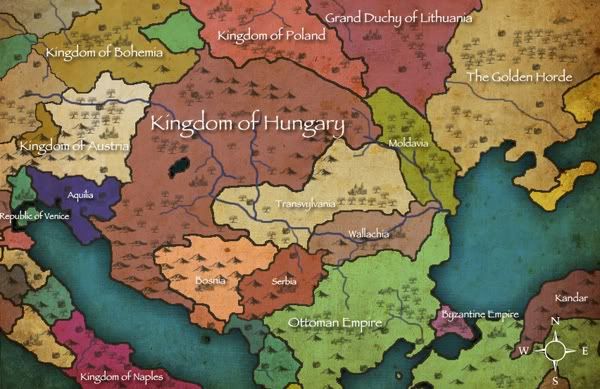
The Kingdom of Hungary and its neighbors in 1404
The War for the Polish Crown officially began on November 22, 1404 when 15,000 men led by King Sigismund I crossed into Polish lands. The Poles were unaware of the aggressiveness of the King of Hungary and due to it were unprepared for the invasion force. The army Sigismund had formed was paid completely by loans taken out by the state; given generously by banks and wealthy families in England and Burgundy. King Sigismund took out the maximum credit he could by the throne to finance his war with Poland, which nearly bankrupted Hungary in the subsequent years.(1)
The King’s army advanced rapidly as it made short work of the small pockets of Polish defenders en route to Krakow. Sigismund and the bulk of his army arrived at the gates of Krakow on December 5. The Poles had quickly recruited an army of 7,000 men to counter the Hungarian army. Most of the Poles were civilians, mainly farmers and lower-class inhabitants near the city of Krakow. They were poorly equipped and out of the 1,000 cavalry they had; over 700 were light cavalry with little armor and wooden spears. The Hungarians had an overwhelming advantage over the smaller Polish army. The only advantage the Poles had was their easily defendable fortress in Krakow, but that wouldn’t stop the Magyars. A pitch battle occurred on December 6 with the Polish army under their general, Zyndram Maszkowic being soundly defeated by the advanced guard of the Hungarian army. Most of the retreating Polish army was destroyed by a 5,000-man cavalry charge led by Sigismund himself. After the battle, the Hungarian army proceeded to besiege the Krakow fortress.
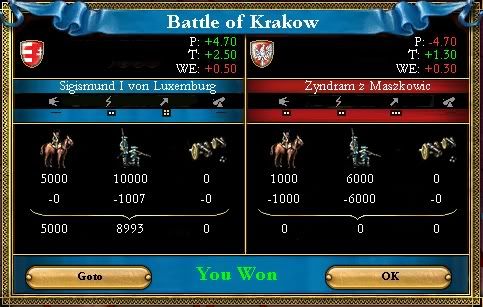
With the bulk of the Hungarian army in Poland, the remaining army of 10,000 men under Lord Barnaby Hunyadi stayed in Hungary to protect its land from invading armies. The nobles cried out for Buda to be defended by Hunyadi’s army. Rumors started to circulate that two small Austrian armies were marching to Hungary. These rumors were confirmed when reports arrived that an army of 3,000 invaded Pressburg while an army of 2,000 invaded Sopron. Hunyadi was not worried as he ordered his army to march to Pressburg to lift the siege on the city.(2)
During his march to Pressburg, news of a Novgorod invasion force reached Hunyadi. Novgorod had invaded Carpathia with 8,000 men led by their King Youfimoi II. Even more reports came in from the region of Ersekujvar that an 8,000-man army led by the Polish King Zygmunt I had invaded and was ransacking the countryside. Hunyadi was perplexed on how the Polish army was able to march around Sigismund’s army. Four Hungarian regions were now being laid to waste by its enemies. Sigismund was occupied with the siege of Krakow, and Hunyadi had the Austrians to defend against.
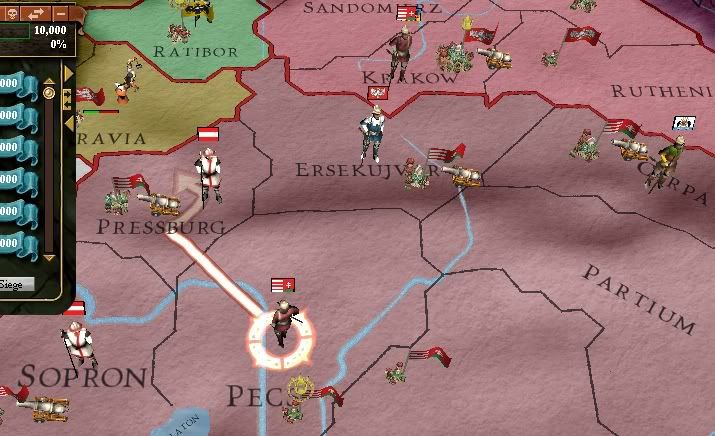
The situation in the War for the Polish Crown in 1405
Good news did reach Hunyadi and the Hungarians with the news of the capitulation of the fortress of Krakow on June 14, 1405. The surrender of Krakow freed up Sigismund’s army to head back to Hungary and attack the Polish army in Ersekujvar.
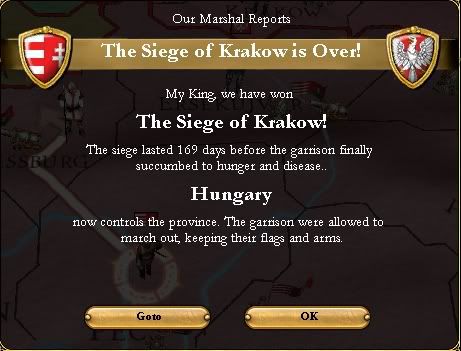
Krakow was burned to the ground under the orders of King Sigismund I
On June 18, Hunyadi attacked the besieging Austrians at Pressburg. The Austrian army was routed and the Hungarian army captured the remaining soldiers. With Pressburg secured, Hunyadi force-marched his army to Sopron, in hopes the citadel had held up against the Austrian siege.
King Sigismund met up with the Polish army under its King Zygmunt on July 6. Battle took place on July 7 as Sigismund defeated the Polish force. The still intact Polish army retreated back into Poland.
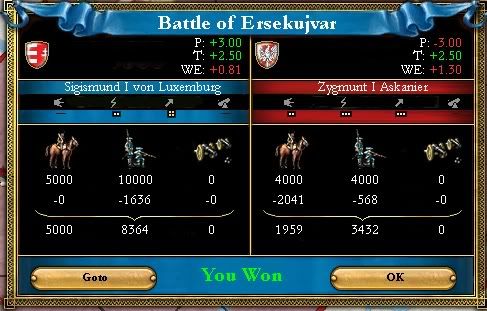
Hunyadi finished his attack on the small Austrian force in Sopron on July 19 with a clear victory. The Austrian threat in the West was defeated for the time being. However, Hunyadi and the rest of Hungary knew it would not be the last of them. Austria’s war with France was coming to an end, and with the war over; the armies of Austria would march toward Hungary.
With the Austrian threat deterred, Hunyadi began his long march to Carpathia to lift the siege from the King of Novgorod. He only hoped its unsuspecting defenders could hold out. After the defeat of the Polish army, King Sigismund decided to chase after the Polish King to Ruthenia in hoping to capture him and end the war quickly. The King, even at the request of his generals, refused to march to Carpathia. His thirst to capture the Polish King had overwhelmed his need to protect the Magyars; a gesture the Hungarians would not forget. Sigismund would allow Hunyadi to defend the lands that had elected him king.
By the beginning of August of 1405, the war had gone well for the Hungarians. Though enemies ravaged the Hun’s lands, they had been soundly defeated. Hunyadi’s belief over limited Austrian involvement had so far been fact, and Krakow had surrendered and subsequently burned by King Sigismund. King Sigismund’s war for the Polish crown had momentous gains in 1405, but danger still lied ahead for Hungary. Austria was still a huge worry for Hunyadi, and the hope of Carpathia withstanding the siege of Novgorod was dashed when news arrived it fell in September 1405.
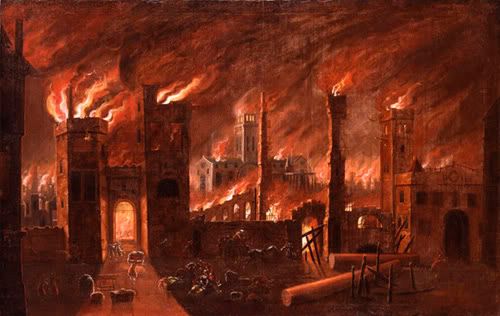
The sacking and consequential burning of Carpathia by Novgorod in 1405
The Fall of Carpathia would rest on Sigismund's mind until his death years later. The nobles would never forget either. With Carpathia taken, Hunyadi worried the tide could be turning against the Kingdom of Hungary.
(1) - Five loans were taken out by Sigismund I to fill the treasury with enough coin to build nine divisions of troops before the war started. The interest as well as paying back the loans later would cause disaster to the treasury and yearly income.
(2) - Historians are still curious on why Hunyadi, known as a tactical genius did not divide his army to attack the Austrians simultaneously. The general sacrificed precious time in order to keep his army together, a tactical risk that should have been taken.
“For every man killed, a thousand shall die. For every battle lost, a war shall we win.” – King Arpad of Hungary
Buda Castle, Hungary – November 11, 1404
Doors opened to the throne room as King Sigismund entered with a large retinue behind him.
“My lord, this must not be done. It will destroy us. As it is, many of the nobles are not too pleased. If this war goes bad, which I believe it will very quickly; our rule may collapse and anarchy will ensue,” pleaded Jeno Horthy, chief diplomat to Hungary.
Sigismund sighed. He slowly sat upon his throne as his forehead wrinkled displaying his deep thought. “We have been preparing for this war for two years; our armies are trained and well-led. Our generals are competent and believe the war will be won. Is this true, Lord Barnaby?”
Lord Barnaby Hunyadi cleared his throat. “Our men will not disappoint, my lord,” Hunyadi stated rather confidently.
“See, Jeno? We have nothing to fear!” Sigismund proclaimed with a swift motion with his hand. “I trust Hunyadi and his skill. If he says we are prepared, then we are ready for war. ”
Horthy looked at Hunyadi. “General, you know this is folly! We are walking our armies into disaster! If we declare war on Poland, half of Eastern Europe will be upon us. Austria, Bavaria and Novgorod will honor their allegiance to the King of Poland. We would already have some difficulty with only Poland, let alone Austria as well,” pressed Horthy.
“Novgorod is too great of distance to really impact the war. Plus if they move too large of an army, they would leave their gates open to Muscowy, which they cannot allow. Bavaria is small and weak, their war with Brandenburg have depleted their ranks,” Hunyadi snapped back.
“And Austria?” asked Horthy.
“You know as well as I that they are involved in a large war with the Kingdom of France. Most of their armies are in the west protecting their interest. Their attention will be focused on France, not us,” Hunyadi answered.
Sigismund rose from his throne. He calmly spoke, “my dear, Jeno, I have faith that all will be well. Hunyadi is not crazed. He understands the implications of our declaration, and believes we still will win.”
Jeno Horthy lowered his head in defeat. “Yes, my lord. I do hope he is right,” responded Horthy.
Sigismund clasped his hands. “Very good than! To war we march; to Krakow we burn!”

The Kingdom of Hungary and its neighbors in 1404
The War for the Polish Crown officially began on November 22, 1404 when 15,000 men led by King Sigismund I crossed into Polish lands. The Poles were unaware of the aggressiveness of the King of Hungary and due to it were unprepared for the invasion force. The army Sigismund had formed was paid completely by loans taken out by the state; given generously by banks and wealthy families in England and Burgundy. King Sigismund took out the maximum credit he could by the throne to finance his war with Poland, which nearly bankrupted Hungary in the subsequent years.(1)
The King’s army advanced rapidly as it made short work of the small pockets of Polish defenders en route to Krakow. Sigismund and the bulk of his army arrived at the gates of Krakow on December 5. The Poles had quickly recruited an army of 7,000 men to counter the Hungarian army. Most of the Poles were civilians, mainly farmers and lower-class inhabitants near the city of Krakow. They were poorly equipped and out of the 1,000 cavalry they had; over 700 were light cavalry with little armor and wooden spears. The Hungarians had an overwhelming advantage over the smaller Polish army. The only advantage the Poles had was their easily defendable fortress in Krakow, but that wouldn’t stop the Magyars. A pitch battle occurred on December 6 with the Polish army under their general, Zyndram Maszkowic being soundly defeated by the advanced guard of the Hungarian army. Most of the retreating Polish army was destroyed by a 5,000-man cavalry charge led by Sigismund himself. After the battle, the Hungarian army proceeded to besiege the Krakow fortress.

With the bulk of the Hungarian army in Poland, the remaining army of 10,000 men under Lord Barnaby Hunyadi stayed in Hungary to protect its land from invading armies. The nobles cried out for Buda to be defended by Hunyadi’s army. Rumors started to circulate that two small Austrian armies were marching to Hungary. These rumors were confirmed when reports arrived that an army of 3,000 invaded Pressburg while an army of 2,000 invaded Sopron. Hunyadi was not worried as he ordered his army to march to Pressburg to lift the siege on the city.(2)
During his march to Pressburg, news of a Novgorod invasion force reached Hunyadi. Novgorod had invaded Carpathia with 8,000 men led by their King Youfimoi II. Even more reports came in from the region of Ersekujvar that an 8,000-man army led by the Polish King Zygmunt I had invaded and was ransacking the countryside. Hunyadi was perplexed on how the Polish army was able to march around Sigismund’s army. Four Hungarian regions were now being laid to waste by its enemies. Sigismund was occupied with the siege of Krakow, and Hunyadi had the Austrians to defend against.

The situation in the War for the Polish Crown in 1405
Good news did reach Hunyadi and the Hungarians with the news of the capitulation of the fortress of Krakow on June 14, 1405. The surrender of Krakow freed up Sigismund’s army to head back to Hungary and attack the Polish army in Ersekujvar.

Krakow was burned to the ground under the orders of King Sigismund I
On June 18, Hunyadi attacked the besieging Austrians at Pressburg. The Austrian army was routed and the Hungarian army captured the remaining soldiers. With Pressburg secured, Hunyadi force-marched his army to Sopron, in hopes the citadel had held up against the Austrian siege.
King Sigismund met up with the Polish army under its King Zygmunt on July 6. Battle took place on July 7 as Sigismund defeated the Polish force. The still intact Polish army retreated back into Poland.

Hunyadi finished his attack on the small Austrian force in Sopron on July 19 with a clear victory. The Austrian threat in the West was defeated for the time being. However, Hunyadi and the rest of Hungary knew it would not be the last of them. Austria’s war with France was coming to an end, and with the war over; the armies of Austria would march toward Hungary.
With the Austrian threat deterred, Hunyadi began his long march to Carpathia to lift the siege from the King of Novgorod. He only hoped its unsuspecting defenders could hold out. After the defeat of the Polish army, King Sigismund decided to chase after the Polish King to Ruthenia in hoping to capture him and end the war quickly. The King, even at the request of his generals, refused to march to Carpathia. His thirst to capture the Polish King had overwhelmed his need to protect the Magyars; a gesture the Hungarians would not forget. Sigismund would allow Hunyadi to defend the lands that had elected him king.
By the beginning of August of 1405, the war had gone well for the Hungarians. Though enemies ravaged the Hun’s lands, they had been soundly defeated. Hunyadi’s belief over limited Austrian involvement had so far been fact, and Krakow had surrendered and subsequently burned by King Sigismund. King Sigismund’s war for the Polish crown had momentous gains in 1405, but danger still lied ahead for Hungary. Austria was still a huge worry for Hunyadi, and the hope of Carpathia withstanding the siege of Novgorod was dashed when news arrived it fell in September 1405.

The sacking and consequential burning of Carpathia by Novgorod in 1405
The Fall of Carpathia would rest on Sigismund's mind until his death years later. The nobles would never forget either. With Carpathia taken, Hunyadi worried the tide could be turning against the Kingdom of Hungary.
-------------------------------
(1) - Five loans were taken out by Sigismund I to fill the treasury with enough coin to build nine divisions of troops before the war started. The interest as well as paying back the loans later would cause disaster to the treasury and yearly income.
(2) - Historians are still curious on why Hunyadi, known as a tactical genius did not divide his army to attack the Austrians simultaneously. The general sacrificed precious time in order to keep his army together, a tactical risk that should have been taken.
Last edited:
I know I promised two to three maps, but unfortunately I didn't have enough time to finish writing as much as I wanted. So I only have one map to show you. But the next update describing the rest of the Polish war will have at least one map if not two.
Hope everyone enjoys the update. Chapter III will be up by Friday (if not tomorrow if I find the time.)
Hope everyone enjoys the update. Chapter III will be up by Friday (if not tomorrow if I find the time.)
You cannot use logic when trying to guess how the AI will act. 
AI cannot into logic.
AI cannot into logic.
You cannot use logic when trying to guess how the AI will act.
AI cannot into logic.
Very true. The AI difficulty is on very hard, but so far in the war, Austria has not really came at me. Novgorod really surprised me. But things change...
Nice looking map and a war going okay so far. Those moaning about Carpathia being captured should also remember that one cannot make an omelette without breaking an egg.
Chapter III - Hunyadi's Glory
The fall of Carpathia and the subsequent burning of the city proved that the Huns were not invincible in a war that had already shown promise to be quick and victorious. Though Hungary had the advantage, its enemies could still strike at the heel of the Huns and do great damage. Subjects surrounding the region of Carpathia screamed foul against their king, Sigismund I. The King and its army had every opportunity to come to the aid of the city after the Battle of Ersekjuvar. However, the King’s bloodlust for the Polish King overrode his general’s pleas to march to Carpathia. Sigismund was willing to sacrifice Carpathia to capture the Polish King; a sacrifice that most Huns did not believe was needed. King Sigismund tried to put the blame of Carpathia’s fall on Lord Hunyadi, but it did not gain much support. The nobles as well as many citizens knew Lord Hunyadi was in the far west fighting two Austrian armies. It was impossible for Hunyadi’s army to defeat these armies and march quickly enough for Carpathia to be saved.
The Polish king, Zygmunt I continued to do rear-guard actions throughout his retreat back into Poland. The Hungarian army chased after Zygmunt and the remaining Polish soldiers. A few engagements occurred during the retreat. These small skirmishes did not destroy the Polish army, though it was indeed a thorn in the side of King Zygmunt. Through Ruthenia and Lublin, Zygmunt would be chased out of his own country’s regions by the larger and persistent army of Sigismund I.
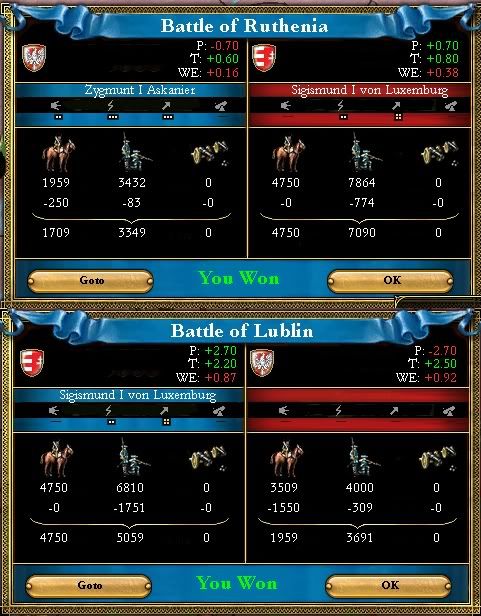
Zygmunt's rear-guard action ultimately saved his army from destruction in the waning months of 1405
With the Hungarians harassing his tired army, he would not be able to rest and reform. The Polish King’s only hope was that Sigismund’s supply lines would be stretched too thin to continue the chase. His hope came true during October of 1405. Sigismund’s army was forced to stop and wait for its supply train to catch up. The Huns had chased the Polish army for nearly two months, but nothing had come from it. A few minor skirmishes were all Sigismund could gain. His goal in capturing King Zygmunt was a complete failure. Besides supply issues plaguing the Huns in Poland, frequent reports came to Sigismund about the state of Hungary’s lands. Hunyadi was being successful in his campaign to defend Hungary, yet his one army could not stand up to the multiple armies that its enemies fielded. He could not, in fact, be everywhere at once. Sigismund had to postpone his attack in Poland and return home to protect his lands.(1)
Lord Hunyadi reached Carpathia on September 23. He confronted a large Novgorod garrison in the remnants of the city. King Yeufimia II of Novgorod was not present, for he had taken a considerable chunk of the army to forage for food and pillage villages in the south of Carpathia. Yet, even without their king, Novgorod’s army was large and well prepared for a battle. For many days, rain fell and caused Hunyadi to wait until the weather cleared. This benefited the defenders with precious time to continue their earthworks and defenses. The rain eventually stopped and on September 29, the two armies met. Hunyadi had a slight number advantage, which would carry the day in the end. The defenders, not wanting to risk the complete annihilation of their army briefly combated the Huns before sounding the retreat. Novgorod would fight again, and next time their king would lead them. Over 1,000 defenders died whereas Hunyadi lost half that amount in the brief battle that occurred.
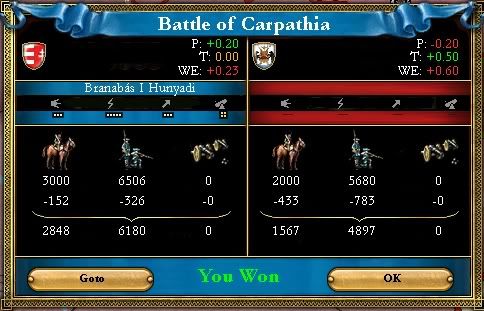
The Huns did not pursue the retreating army, instead Hunyadi decided to stay and help the local Magyars. Hunyadi ordered food and water to be taken from the army’s stores and given to the starving Carpathian populace. His army erected new defenses including a large palisade to given minimal protection to the inhabitants. It wasn’t much, but it was more than the local populace expected and they were grateful for his humanitarian act.
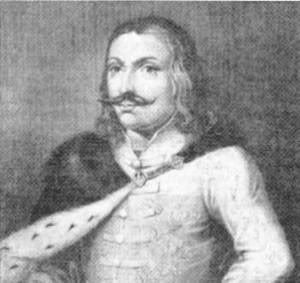
Lord Branabus Hunyadi, "Victor of the Magyars"(2)
On October 11, King Yeufimia II and his army returned from gathering supplies in the south. The King of Novgorod had not received word of the defeat of his garrison in Carpathia. Due to this, his army was completely caught by surprise when arrows welcomed them instead of open arms. King Yeufimia tried to order his troops to form battle positions, but all was lost. Hunyadi, with the help of his spies knew of the approaching army. Hunyadi put a great amount of work into keeping his ruse effective and it paid off. Yeufimia and his army were crushed by Hunyadi’s pincer movement. In the process of the enveloping Huns, Yeufimia and his small retinue of knights were cut off from the main body of his army. Conflicting stories arise on what Novgorod’s king said. Many said that all was lost and he ordered his knights to flee with him. Others, especially the Rus, try to defend their old king’s honor and believe it was his knights that refused to fight on. In either case, Yeufimia took his chance to escape. With the king fleeing, panic erupted among the ranks of the Novgorod army and it collapsed. It was total carnage on the battlefield. Some of Yeufimia’s army tried to surrender and were cut down by the Huns before Hunyadi was able to wrestle control of his army. In the end, it was a devastating loss for Novgorod. King Yeufimia with the few remaining knights he had was running away with no intention to stop. The entire army he once commanded either fell in the battle or surrendered. Once again, Lord Hunyadi had given victory to the Magyars.
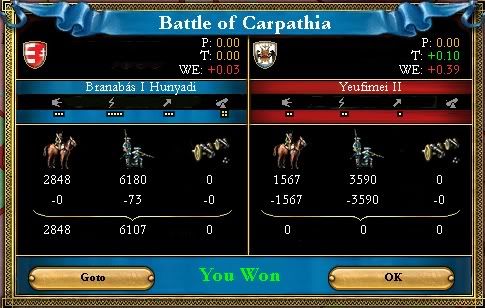
A remarkable victory for Hunyadi and the Hungarian army
In the following month, Hunyadi would encounter three small armies of Novgorod as they attacked Carpathia. Each attack was successfully repelled. Hunyadi believed that these armies were remnants of the force that once garrisoned Carpathia. Without their king, the disintegrating army ultimately disbanded or was destroyed in pieces by the Huns. Novgorod would never be a factor in the War for the Polish Throne again.
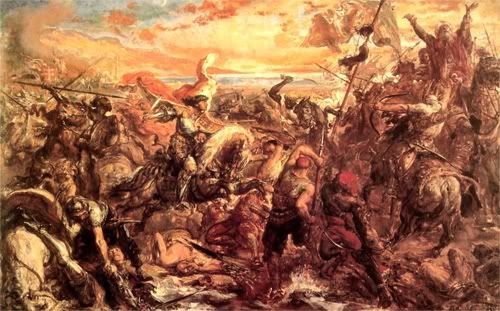
Lord Hunyadi at center in one of his victorious battles against Novgorod on the steppes of Carpathia
Their armies defeated, their king humiliated and their lands invaded by Muscowy forced Novgorod to come to terms with Sigismund I. A white peace would be signed between the two countries on April 5, 1406. Hunyadi’s prediction that Muscowy would smell blood and attack a weakened Novgorod proved to be correct.(3)
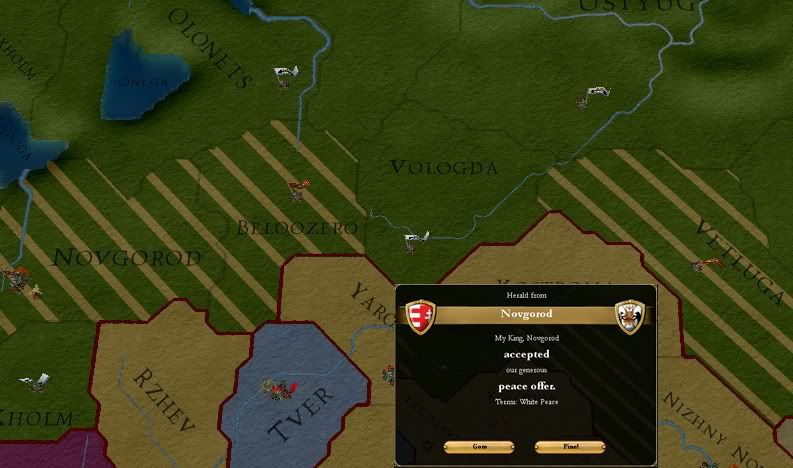
Muscowy's invasion of Novgorod in 1406 led to the country's removal in the war against Hungary
The Kingdom of Hungary had one less enemy to worry about, yet Poland and Austria still had fight in them. The war would continue on.
(1) - Historians have debated on why it took so long for King Sigismund to return to Hungary to defend against Novgorod's bold attacks. Though Sigismund claimed it was to defend his people, most believe it was to defend his throne. His obsession in capturing the Polish King could have sealed his fate in losing the throne of Hungary.
(2) - Lord Branabus Hunyadi received the title, "Victor of the Magyars" after being the decisive factor in protecting Hungary from invading armies in the War of the Polish Throne, 1404-1409.
(3) - The Kingdom of Hungary is considered to be very fortunate that Muscowy invaded Novgorod in 1406. Without Muscowy's involvement, Novgorod would have stayed in the war against Hungary. Today, many scholars believe Jeno Horthy, chief diplomat to Hungary had something to do with Muscowy conveniently going to war in 1406. It has been recorded that Horthy was on a routine diplomatic mission in the East, and stopped in the court of Muscowy in late 1405.
The fall of Carpathia and the subsequent burning of the city proved that the Huns were not invincible in a war that had already shown promise to be quick and victorious. Though Hungary had the advantage, its enemies could still strike at the heel of the Huns and do great damage. Subjects surrounding the region of Carpathia screamed foul against their king, Sigismund I. The King and its army had every opportunity to come to the aid of the city after the Battle of Ersekjuvar. However, the King’s bloodlust for the Polish King overrode his general’s pleas to march to Carpathia. Sigismund was willing to sacrifice Carpathia to capture the Polish King; a sacrifice that most Huns did not believe was needed. King Sigismund tried to put the blame of Carpathia’s fall on Lord Hunyadi, but it did not gain much support. The nobles as well as many citizens knew Lord Hunyadi was in the far west fighting two Austrian armies. It was impossible for Hunyadi’s army to defeat these armies and march quickly enough for Carpathia to be saved.
The Polish king, Zygmunt I continued to do rear-guard actions throughout his retreat back into Poland. The Hungarian army chased after Zygmunt and the remaining Polish soldiers. A few engagements occurred during the retreat. These small skirmishes did not destroy the Polish army, though it was indeed a thorn in the side of King Zygmunt. Through Ruthenia and Lublin, Zygmunt would be chased out of his own country’s regions by the larger and persistent army of Sigismund I.

Zygmunt's rear-guard action ultimately saved his army from destruction in the waning months of 1405
With the Hungarians harassing his tired army, he would not be able to rest and reform. The Polish King’s only hope was that Sigismund’s supply lines would be stretched too thin to continue the chase. His hope came true during October of 1405. Sigismund’s army was forced to stop and wait for its supply train to catch up. The Huns had chased the Polish army for nearly two months, but nothing had come from it. A few minor skirmishes were all Sigismund could gain. His goal in capturing King Zygmunt was a complete failure. Besides supply issues plaguing the Huns in Poland, frequent reports came to Sigismund about the state of Hungary’s lands. Hunyadi was being successful in his campaign to defend Hungary, yet his one army could not stand up to the multiple armies that its enemies fielded. He could not, in fact, be everywhere at once. Sigismund had to postpone his attack in Poland and return home to protect his lands.(1)
Lord Hunyadi reached Carpathia on September 23. He confronted a large Novgorod garrison in the remnants of the city. King Yeufimia II of Novgorod was not present, for he had taken a considerable chunk of the army to forage for food and pillage villages in the south of Carpathia. Yet, even without their king, Novgorod’s army was large and well prepared for a battle. For many days, rain fell and caused Hunyadi to wait until the weather cleared. This benefited the defenders with precious time to continue their earthworks and defenses. The rain eventually stopped and on September 29, the two armies met. Hunyadi had a slight number advantage, which would carry the day in the end. The defenders, not wanting to risk the complete annihilation of their army briefly combated the Huns before sounding the retreat. Novgorod would fight again, and next time their king would lead them. Over 1,000 defenders died whereas Hunyadi lost half that amount in the brief battle that occurred.

The Huns did not pursue the retreating army, instead Hunyadi decided to stay and help the local Magyars. Hunyadi ordered food and water to be taken from the army’s stores and given to the starving Carpathian populace. His army erected new defenses including a large palisade to given minimal protection to the inhabitants. It wasn’t much, but it was more than the local populace expected and they were grateful for his humanitarian act.

Lord Branabus Hunyadi, "Victor of the Magyars"(2)
On October 11, King Yeufimia II and his army returned from gathering supplies in the south. The King of Novgorod had not received word of the defeat of his garrison in Carpathia. Due to this, his army was completely caught by surprise when arrows welcomed them instead of open arms. King Yeufimia tried to order his troops to form battle positions, but all was lost. Hunyadi, with the help of his spies knew of the approaching army. Hunyadi put a great amount of work into keeping his ruse effective and it paid off. Yeufimia and his army were crushed by Hunyadi’s pincer movement. In the process of the enveloping Huns, Yeufimia and his small retinue of knights were cut off from the main body of his army. Conflicting stories arise on what Novgorod’s king said. Many said that all was lost and he ordered his knights to flee with him. Others, especially the Rus, try to defend their old king’s honor and believe it was his knights that refused to fight on. In either case, Yeufimia took his chance to escape. With the king fleeing, panic erupted among the ranks of the Novgorod army and it collapsed. It was total carnage on the battlefield. Some of Yeufimia’s army tried to surrender and were cut down by the Huns before Hunyadi was able to wrestle control of his army. In the end, it was a devastating loss for Novgorod. King Yeufimia with the few remaining knights he had was running away with no intention to stop. The entire army he once commanded either fell in the battle or surrendered. Once again, Lord Hunyadi had given victory to the Magyars.

A remarkable victory for Hunyadi and the Hungarian army
In the following month, Hunyadi would encounter three small armies of Novgorod as they attacked Carpathia. Each attack was successfully repelled. Hunyadi believed that these armies were remnants of the force that once garrisoned Carpathia. Without their king, the disintegrating army ultimately disbanded or was destroyed in pieces by the Huns. Novgorod would never be a factor in the War for the Polish Throne again.

Lord Hunyadi at center in one of his victorious battles against Novgorod on the steppes of Carpathia
Their armies defeated, their king humiliated and their lands invaded by Muscowy forced Novgorod to come to terms with Sigismund I. A white peace would be signed between the two countries on April 5, 1406. Hunyadi’s prediction that Muscowy would smell blood and attack a weakened Novgorod proved to be correct.(3)

Muscowy's invasion of Novgorod in 1406 led to the country's removal in the war against Hungary
The Kingdom of Hungary had one less enemy to worry about, yet Poland and Austria still had fight in them. The war would continue on.
----------------------------------------
(1) - Historians have debated on why it took so long for King Sigismund to return to Hungary to defend against Novgorod's bold attacks. Though Sigismund claimed it was to defend his people, most believe it was to defend his throne. His obsession in capturing the Polish King could have sealed his fate in losing the throne of Hungary.
(2) - Lord Branabus Hunyadi received the title, "Victor of the Magyars" after being the decisive factor in protecting Hungary from invading armies in the War of the Polish Throne, 1404-1409.
(3) - The Kingdom of Hungary is considered to be very fortunate that Muscowy invaded Novgorod in 1406. Without Muscowy's involvement, Novgorod would have stayed in the war against Hungary. Today, many scholars believe Jeno Horthy, chief diplomat to Hungary had something to do with Muscowy conveniently going to war in 1406. It has been recorded that Horthy was on a routine diplomatic mission in the East, and stopped in the court of Muscowy in late 1405.
Last edited:
Very nice. Fortune always seems to smile on us in the beginning of our games, eh? Horthy 'tis a wondrous chap I say.
I am enjoying this a lot. I love the map, of course, but I also like your narrative style, and the little details.
I've always felt sorry for Hungary in a way, both in real life and EU3 they almost always end up crushed by their neighbours.
I also like how you've integrated generals and advisors into the mix too.
I've always felt sorry for Hungary in a way, both in real life and EU3 they almost always end up crushed by their neighbours.
I also like how you've integrated generals and advisors into the mix too.
Oh yeah, nice victories. But every battle increases thy WE...
When they see us they will run for their lives
To the end they will pay for their lies
So long did we wait, now we are home
Here once again there's a battle to fight
Gather together for the sound and the might
So long did we wait, now we are home
Now we will fight for the kingdom, fighting with steel
Kill all of them, their blood is our seal
Fight till the last of the enemy is dead
Ride through their blood that we gladly have shed
I now issue the call, are you ready to fight - yeah
Fight altogether as one for the right
To be free once again - tonight we will win
I can see by the look that you have in your eyes
You came here for metal, to fight and to die
Defenders of steel, now we are home
Fight for the kingdom bound for glory
Armed with a heart of steel
I swear by the brothers who stand before me
To no man shall I kneel
Then blood is upon my steel
When they see us they will run for their lives
To the end they will pay for their lies
So long did we wait, now we are home
Here once again there's a battle to fight
Gather together for the sound and the might
So long did we wait, now we are home
Now we will fight for the kingdom, fighting with steel
Kill all of them, their blood is our seal
Fight till the last of the enemy is dead
Ride through their blood that we gladly have shed
I now issue the call, are you ready to fight - yeah
Fight altogether as one for the right
To be free once again - tonight we will win
I can see by the look that you have in your eyes
You came here for metal, to fight and to die
Defenders of steel, now we are home
Fight for the kingdom bound for glory
Armed with a heart of steel
I swear by the brothers who stand before me
To no man shall I kneel
Then blood is upon my steel
Eber, your AAR has been chosen by the wise heads of...well, my wise head, to be showcased for all of AARland! Go over to the showcase thread and make your appearance! And don't forget to choose a successor in a week's time. 
Nice AAR. It'll be interesting to see how Hungary develops. You might spend the next few centuries locked in a battle to keep a lid on the Turks, or you might be able to find peace and perhaps a chance to expand Hungarian influence overseas.
Kapt Torbjorn said:Very nice. Fortune always seems to smile on us in the beginning of our games, eh? Horthy 'tis a wondrous chap I say.
Yes, definitely. I've been very fortunate in the beginning of the game. Eastern Europe is full of large powers (i.e. Bohemia, Poland, Lithuania, Austria and the Ottoman Empire.) Of course, I'm fairly large myself compared to Transylvania
I am enjoying this a lot. I love the map, of course, but I also like your narrative style, and the little details.
I've always felt sorry for Hungary in a way, both in real life and EU3 they almost always end up crushed by their neighbours.
I also like how you've integrated generals and advisors into the mix too.
Thank you, Ashantai! I worked hard on the map, placing the trees, mountains and villages/cities.
sprites said:without Lithuania i don't think Poland will win this war
Funny that you would say that...
Enewald said:Oh yeah, nice victories. But every battle increases thy WE...
I've been luck in victories so far. I do lose some big battles, and my WE does sky-rocket. The war lasts for 5 years (until 1409) so it really hurt my economy and manpower. Most of the war, I had no reserved manpower, it was feeding directly into my armies each month.
Honestly, I had NO idea that when I declared war on Poland, all its allies would honor their allegiance. I was especially surprised with Novgorod and Austria. What made it worse is that two of my three allies dishonored their alliances with me, Bohemia, which would have extremely helped and the Teutonic Knights, which again would have helped a lot. Only Transylvania, my vassal came to my aid. Without them, I was pretty much alone against four powers (yes I said four...dun dun dun) To think of it, I'm surprised I didn't mention that in my story. Oops.
Oh and ManoWar lyrics eh...
Myth said:Eber, your AAR has been chosen by the wise heads of...well, my wise head, to be showcased for all of AARland! Go over to the showcase thread and make your appearance! And don't forget to choose a successor in a week's time.
Thank you so much Myth for the nomination! It means a lot. I definitely won't forget to choose my successor in a week. I love having the power.
Tommy4ever said:Nice AAR. It'll be interesting to see how Hungary develops. You might spend the next few centuries locked in a battle to keep a lid on the Turks, or you might be able to find peace and perhaps a chance to expand Hungarian influence overseas.
Well, I haven't played too far in the game. I do this so it forces me to write.
Thanks for the compliment! Glad to have you on board!
Van5 said:Go go hungary
My words exactly.
The next update, which will be the final chapter of the Polish War will not be made until Tuesday or Wednesday. I have a huge paper on Rousseau, Burke and Adam Smith's ideas of liberty that is due tomorrow. In fact, I should be going to do that right now...
It's all about the maps. The need to make a cool periodesque map is what motivates good updates. Though it kills your freetime as you search for names of cities in languages you don't speak that haven't existed in the region for 400 years.

